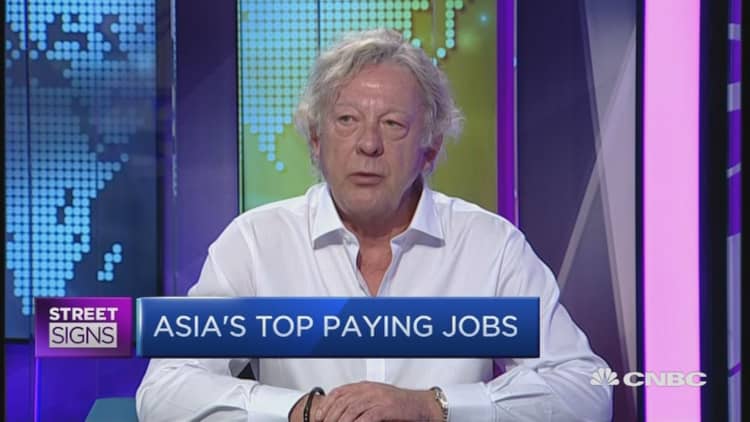
Long gone are the days when searching for a job included sitting down with pencil and a newspaper, scouring the help wanted ads.
But 2017 offers a host of different options for job-hunters: LinkedIn, Indeed and Monster to name a few. Understandably, many ask which of the varied platforms is most worthy of their time, but maybe the better question is: What do you have to offer?
"If you go back to a few years ago when I looked for a job, it was very...simple," Robert Walters, CEO of an eponymous recruitment firm, told CNBC. "There were about five or six categories. And now you're faced with a multitude of different job titles."
Speaking with CNBC's "Street Signs" about his company's 2017 global salary survey, Walters said the key takeaway was that there are many jobs out there as long as people have the right skills.
"The big driver, of course, on all areas is technology," Walters said. "So tech skills are relevant to anything from marketing through to pure technology, project management, banking compliance."
Perhaps unsurprising to some, the survey found that there's high demand for people with skills in big data, cloud computing, cyber security and financial technologies. Specialists in these areas can command substantial pay bumps when switching jobs or returning home. And for the bankers out there, demand was high for legal, risk and compliance experts.
That supports evidence gathered by Expatfinder.com, which showed employers in Asia are hunting for talent in finance and tech, with talent shortages in finance being the highest in Hong Kong. For tech, it's Mumbai.
That endless, ongoing search
People looking for jobs can spend months, even years chasing the right position — or any position. Some go after the companies that will let them work from home. Others hold out for well-paid, in-demand jobs. And the lucky ones who do manage to get a call back sometimes have to navigate the weird and wonderful world of job interviews.
Still, others who have jobs aren't necessarily holding on to them. Job switching in Japan climbed to a seven-year high in 2016 as a tight labor market helped people make mid-career moves.
According to the Robert Walters survey, workers in the United Kingdom aren't feeling loyal to their current companies. About 94 percent admitted they are open to solicitation for a new job, even if they're not actively looking. In New Zealand, 61 percent of professionals surveyed said they'll be looking to move jobs in the next 12 months. Next door in Australia, 56 percent are looking to jump ship in the next 21 months. Professionals hoping to move onward and upwards in Thailand and Vietnam said they expected to earn anywhere from 10 percent to 25 percent more in their new jobs.
"IT professionals with niche skill sets and good business acumen will be in a strong position to negotiate higher salaries and choose between multiple job offers," the survey report said.
Rise of the robots
But with robots on the rise, can the outlook for the highly-skilled employment market remain rosy? You have Softbank CEO Masayoshi Son predicting robots will outnumber humans within 30 years, and other tech CEOs are saying governments may have to consider paying their citizens a basic income as artificial intelligence threatens more jobs.
"I think you're seeing some extraordinary changes going on in manufacturing, and once again it's driven by technology," Walters said. "It's only going to accelerate in terms of pace and change."
But Walters seemed just as concerned about the positions that aren't getting filled because of either a lack of skills or immigration policies.
"I was in our San Francisco office the other day and talking to people in product development there. It's just, there's nobody around to do the work," he said.
"The great irony is if you look at somewhere like San Francisco, where you have Stanford University, you have a lot of Asian and European students studying there. And because of the lack of work permits, they get kicked out," Walters explained. "So you've got this incredible skill shortage in certain pockets around the world, San Fran being one. And of course the salaries being commanded by those few people who can do it well is off the scale."

